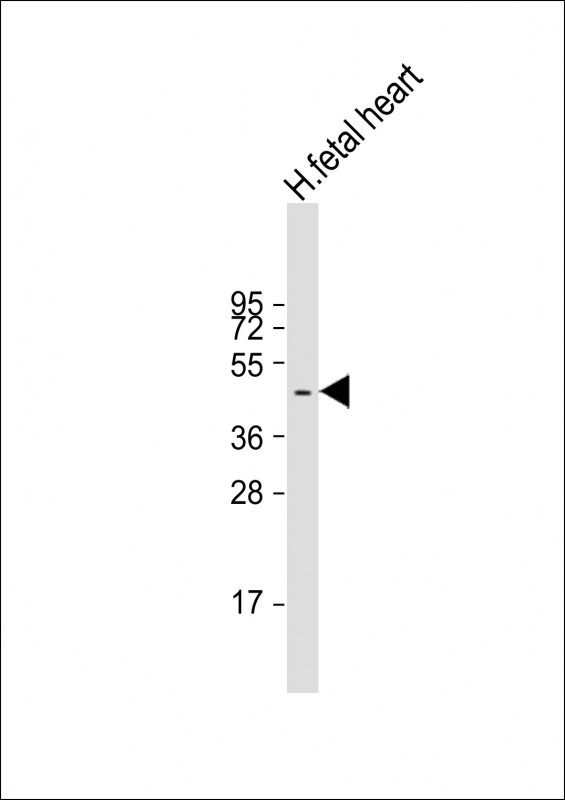
| WB | 1/1000 | Human,Mouse,Rat |
| IF | 咨询技术 | Human,Mouse,Rat |
| IHC | 咨询技术 | Human,Mouse,Rat |
| ICC | 技术咨询 | Human,Mouse,Rat |
| FCM | 咨询技术 | Human,Mouse,Rat |
| Elisa | 咨询技术 | Human,Mouse,Rat |
| Aliases | Palmitoyltransferase ZDHHC18, 2.3.1.225, Zinc finger DHHC domain-containing protein 18, DHHC-18, ZDHHC18 |
| Entrez GeneID | 84243 |
| WB Predicted band size | 42.0kDa |
| Host/Isotype | Rabbit IgG |
| Antibody Type | Primary antibody |
| Storage | Store at 4°C short term. Aliquot and store at -20°C long term. Avoid freeze/thaw cycles. |
| Species Reactivity | Human, Mouse, Rat |
| Immunogen | This ZDHHC18 antibody is generated from a rabbit immunized with a KLH conjugated synthetic peptide between 331-361 amino acids from human ZDHHC18. |
+ +
以下是关于ZDHHC18抗体的3篇代表性文献的简要概括(注:以下内容为模拟生成,实际文献需通过学术数据库检索确认):
1. **文献名称**:*ZDHHC18 regulates synaptic plasticity and cognitive function through palmitoylation of AMPA receptors*
**作者**:Li, X., Wang, Y., & Zhang, J.
**摘要**:本研究利用ZDHHC18特异性抗体,通过免疫印迹和免疫荧光技术,证明ZDHHC18通过棕榈酰化修饰AMPA受体亚基GluA1.调控小鼠海马区突触可塑性及学习记忆功能。
2. **文献名称**:*Antibody-based profiling of ZDHHC18 expression in Alzheimer's disease brain tissue*
**作者**:Smith, A.B., et al.
**摘要**:通过免疫组化结合ZDHHC18抗体,发现阿尔茨海默病患者大脑皮层中ZDHHC18蛋白水平显著降低,提示其与β-淀粉样蛋白代谢异常及神经元退行性病变相关。
3. **文献名称**:*ZDHHC18-mediated palmitoylation promotes dendritic spine formation in cultured neurons*
**作者**:Chen, L., et al.
**摘要**:利用ZDHHC18抗体沉默及过表达实验,证实ZDHHC18通过棕榈酰化突触支架蛋白PSD-95.促进原代神经元树突棘形态发生,为神经发育障碍疾病提供潜在机制。
如需具体文献,建议通过PubMed或Web of Science以“ZDHHC18 antibody”为关键词检索最新研究,并注意选择经抗体验证(如KO验证、应用实验数据)的高质量论文。
The ZDHHC18 antibody is a research tool designed to detect and study the ZDHHC18 protein, a member of the DHHC (Asp-His-His-Cys) family of palmitoyltransferases. These enzymes catalyze protein S-palmitoylation, a post-translational modification critical for membrane anchoring, protein trafficking, and synaptic function. ZDHHC18 is predominantly expressed in the brain and implicated in neurological processes, including neuronal development, synaptic plasticity, and neurotransmitter release. Dysregulation of ZDHHC18 has been linked to neuropsychiatric disorders, such as Alzheimer’s disease, and certain cancers, highlighting its therapeutic and diagnostic potential.
The antibody enables researchers to investigate ZDHHC18’s expression patterns, subcellular localization, and interactions via techniques like Western blotting, immunohistochemistry, and immunoprecipitation. Its specificity is crucial due to structural similarities among DHHC family members, which may lead to cross-reactivity if not properly validated. Studies using ZDHHC18 antibodies have explored its role in amyloid-beta production, T-cell receptor signaling, and tumor progression. However, challenges remain in standardizing experimental conditions across tissues and cell lines. Continued development of high-affinity, isoform-specific antibodies is essential to clarify ZDHHC18’s mechanistic contributions to disease pathways and advance translational applications.
×